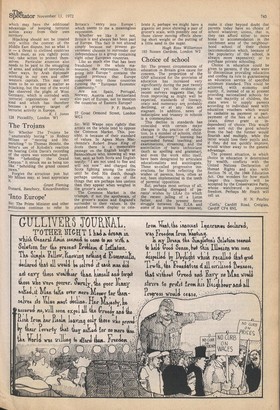Choice of school
Sir: The present circumstances of education in Britain give cause for concern. The proportion of the GNP allocated for the provision of education has increased very significantly during the past twenty years and yet the evidence of recent surveys suggests that, far from improving as might well be expected, standards of literacy, oracy and numeracy are, probably declining, or at any rate are stagnant. In addition, news of indiscipline and truancy in schools is a commonplace.
This decline in standards has coincided with certain major changes in the practice of education. In a number of schools, childcentred " discovery " learning has superseded formal teaching; and examinations, streaming, and the assimilation of basic technicians (such as spelling and grammar), and even the work ethic itself, have been denigrated by articulate educationalists and sociologists. These so-called progressive innovations, far from reflecting the wishes of parents, have, often as not, been implemented in the teeth of parental opposition.
But, perhaps most serious of all, the increasing disregard of parents' wishes by LEAs (to which the recent jailing of a Luton father, and the present fierce struggle between the ILEA and some of its parents bear witness), make it clear beyond doubt that parents today have no choice of school whatever; unless, that is, they can afford either to move home to accommodation in the catchment area of the neighbourhood school of their choice (accommodation which, because of the popularity of the school, is always more expensive); or to purchase private schooling.
Choice in education could be given to parents, if the state were to discontinue providing education and confine its role to guaranteeing an education service of specified minimum standard. This could be achieved, with economy and equity, if, instead of as at present providing nationalised schools for the vast majority of children, the state were to supply parents according to individual need with education vouchers which would be cashable as payment or partpayment of the fees of a school
(state, direct grant or independent) of choice. This would soon sort out the good schools from the bad: the former would flourish and multiply, while the latter would lose their pupils and, if they did not quickly improve, would wither away to the general advantage.
The present situation, in which choice in education is determined by wealth, conflicts with the United Nations Declaration of Human Rights and also with Section 76 of the 1944 Education Act. One wonders for how much longer this inequity will be accepted by the Conservative Party, whose watchword is personal freedom. Perhaps Mr Heath will tell us.
H. N. Paulley ' Corfu,' Cardiff Road, Creigiau, Cardiff CF4 8NL


















































 Previous page
Previous page